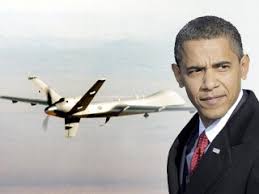 Is the CIA's secret program of drone strikes against terrorists in Pakistan and Yemen a case of illegal assassinations or legitimate self defense?
Is the CIA's secret program of drone strikes against terrorists in Pakistan and Yemen a case of illegal assassinations or legitimate self defense?That was a central question Wednesday as the program came under fire from several legal scholars who called for greater oversight by Congress, arguing the attacks may violate international law and put intelligence officers at risk of prosecution for murder in foreign countries.
Four law professors offered conflicting views, underscoring the murky legal nature of America's nine-year-old war against extremists. The conflict has spread from wars in Iraq and Afghanistan to a complex campaign against al-Qaida, the Taliban and other insurgents worldwide.
Both the Bush and Obama administrations have defended the use of attacks from unmanned aircraft. But they have also tiptoed around the issue because the CIA program - which has escalated in Pakistan over the past year - is classified and has not yet been acknowledged publicly by the government.
The CIA strikes are "a clear violation of international law," said Mary Ellen O'Connell, law professor at the University of Notre Dame Law School, who added that going after terrorists should be a law enforcement activity.
More...
She said the rest of the world does not recognize American authority to carry out attacks in Yemen and Pakistan, countries where the U.S. is not involved in direct armed conflict.
CIA officers who operate the drones could be arrested and charged with murder in other countries, O'Connell warned, likening it to having the Mexican police or military bomb hotels in Arizona in order to target drug lords who may be hiding there.
Others on the panel disagreed, saying enemy forces are legitimate targets, particularly when they operate out of countries that won't take action themselves.
The U.S. has long declared the legal view that as important as sovereignty is, "it is lawful to go and strike a person where a country is unable or unwilling" to control its own territory, said Kenneth Anderson, a professor at American University's Washington College of Law.
CIA spokesman George Little would only say Wednesday that the CIA's counterterrorism operations are conducted in strict accord with the law.
